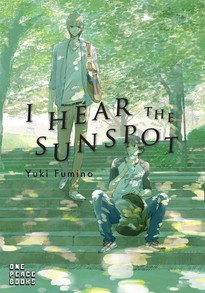Review
by Rebecca Silverman,I Hear the Sunspot
GN
| Synopsis: |  |
||
College student Taichi is always struggling to make ends meet, to the point where he rarely even attends his classes because he's working to pay for them. Perpetually down on his luck and hungry, one day he stumbles upon fellow student Kohei eating lunch by himself on a roof. Kohei offers him his lunch, and Taichi becomes his fast friend. But Kohei suffers from hearing loss after an illness in middle school, and he's wary of people treating him differently because of his disability. Can he bring himself to trust in Taichi's friendship? |
|||
| Review: | |||
The third story about someone with hearing loss to come out in English in recent years, I Hear the Sunspot is also perhaps the most thoughtful. While A Silent Voice shines a light on bullying and So Cute It Hurts!! takes a romantic angle, Yuki Fumino's graphic novel instead looks at the impact that the so-called kindness of others can have on someone, and how that can lead to voluntary isolation. The story follows two college students, Taichi and Kohei. Taichi is a genuinely nice guy, the kind of person who makes friends and holds on to them. He's also going through a rough patch in his life – raised by his grandfather following his parents' divorce (which resulted in his abandonment), Taichi allowed himself to be convinced to go to college, but he's not sure that it's really the right move. He's obsessed with helping to support his grandfather and not being a financial burden, and his worries aren't without merit. Taichi ends up working to the point of not eating well or even attending his classes. That begins to change when he meets Kohei by chance – he literally falls off a wall into Kohei's life. Kohei, a fellow first-year, has voluntarily isolated himself as a way to maintain his sense of worth and dignity: in his last year of middle school, Kohei suffered severe hearing loss as a result of an illness. Somehow convinced that it's his fault while simultaneously resenting the “help” offered by well-meaning classmates (and his exclusion from ordinary social activities), Kohei has decided to remain alone. When Taichi falls into his life, however, he finds that the other young man won't be deterred, and they end up forming a friendship that begins to lead to something more. Although I Hear the Sunspot is nominally BL, romance really isn't the dominant theme. The story instead focuses on the idea of self-worth, with Kohei's feelings that he's somehow to blame for his condition at the center of it. Following his hearing loss, Kohei finds that his status as “special” (as in special ed) combined with his good looks makes him a target for girls who want to feel like they're doing something good. They use Kohei for their own self-aggrandizement, while others, particularly his male classmates, exclude him from things because it feels like too much trouble to explain things or speak so that he can hear them or read their lips. Kohei even goes so far as to refuse to learn sign language because he feels like that will further mark him out and isolate him. That's a familiar feeling to almost anyone of a certain age (and perhaps even now) who has been “labeled” by the school community as being special needs. Whether it's an IEP that you have to have the teacher sign, sitting out of gym, or having to ask a classmate to be a note-taker, it's a kind of singling out that can bring both the unwelcome teasing of others or the “sympathy” of people who may genuinely want to be helpful but don't realize that being treated normally is a much better way to show it. Kohei's resentment and discomfort at suddenly being part of the “special” group is well-expressed by the book, and Taichi's near-oblivion to the fact that his new friend is different in any noteworthy way drives both the plot and Kohei's own development. Taichi immediately latches on to Kohei as a person he enjoys being with and wants to keep hanging around; Kohei needs time to realize that to Taichi, he's just a regular guy not marked out by his disability. Ultimately that's what leads to the romance, although the story would honestly have worked without it. Fumino mentions that she initially didn't know (or forgot) that she was writing for a BL publication, but the romance doesn't feel shoehorned in; instead it adds a sweetness to the book that simply brings the guys' closeness to a different level. It's nearly incidental but not quite – ultimately the story is still about Kohei coming to terms with himself as hearing impaired but still whole – but I can't complain about the inclusion of a love story. I Hear the Sunspot is a genuinely nice book. Covering the topic of hearing loss in a thoughtful but not heavy-handed way, the story is equal parts about Kohei learning to like both himself and Taichi, and Taichi coming to understand his friend in a new way. The art isn't spectacular, but it is soft and easy to read, and One Peace Books' translation one of their best efforts. If you're looking for a quiet story that lingers on in your mind, this is one to pick up. |
| Grade: | |||
|
Overall : A-
Story : A-
Art : B
+ Thoughtful examination of being “labeled” in a school setting, nice exploration of the guys' relationship |
|||
| discuss this in the forum (3 posts) | | |||
| Production Info: | ||
|
Full encyclopedia details about Release information about |
||